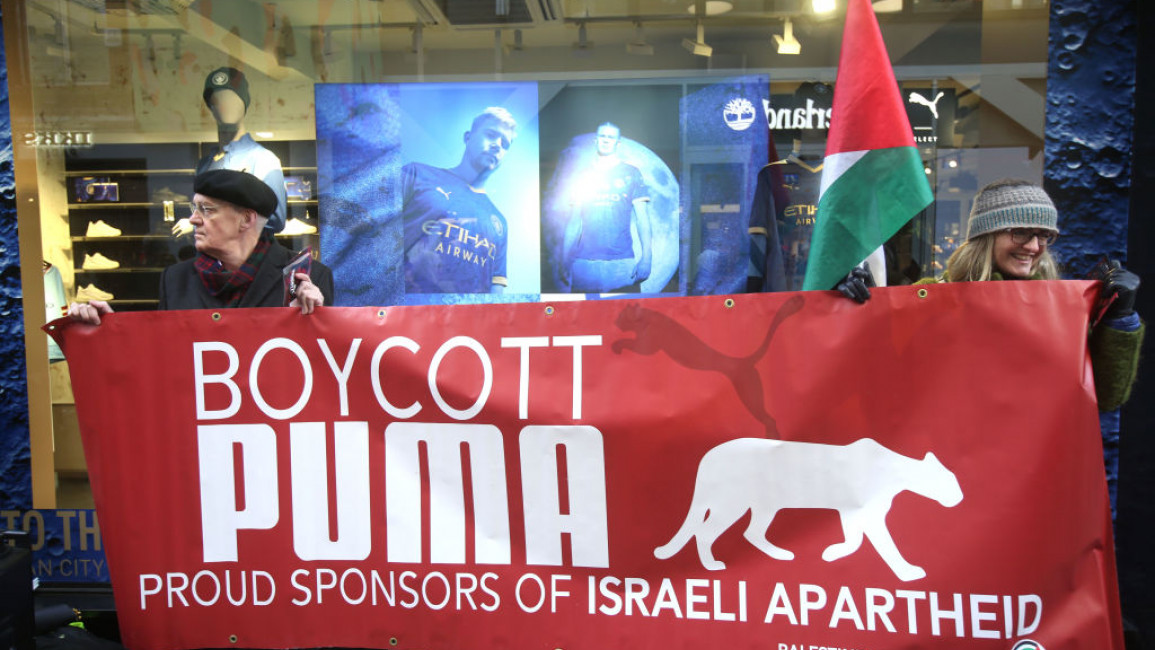
We forced PUMA to end Israel ties. Here are the lessons learned for Palestine solidarity
Our campaign to pressure global sportswear brand PUMA has recently forced the company to end its sponsorship of the Israel Football Association (IFA), capping a successful five-year effort led by the Palestine Solidarity Campaign branches across Britain, along with partners around the world.
No doubt, this is a victory for the Palestine solidarity movement at an extremely bleak time for Palestinians, especially in Gaza. Yet one worth reflecting and building on.
The IFA governs on behalf of football clubs in illegal Israeli settlements on land stolen from Palestinians. Outwardly a sports body, it is in fact part of the infrastructure that sustains Israel’s colonisation of Palestinian land.
In 2018, over 200 Palestinian sports teams urged PUMA to end its sponsorship, kick-starting the global campaign coordinated by the Palestinian-led Boycott, Divestment and Sanctions (BDS) movement and taken up by campaigners around the world.
As these words are written, Israel is engaged in an unprecedented assault on the besieged Gaza Strip. Every day, entire residential neighbourhoods are levelled by Israel’s carpet bombing in attacks described by UN experts as a “genocide in the making.” Elsewhere across Palestine, Israel is continuing its devastating campaign of military invasions and assassinations in an all-out offensive on the Palestinian people.
Over the last two months, over a million people in Britain have taken to the streets in solidarity with the Palestinian struggle for freedom and justice. As more and more people are motivated to act in solidarity with Palestine, and are looking to engage in campaigns to end the complicity of our government and corporations in Israel’s attacks, it’s important to learn the lessons of the boycott PUMA campaign for our future work.
Lessons of solidarity
In the campaign targeting PUMA we used a diverse range of tactics, from pickets to sit-ins, and Twitter (now X) storms to solidarity football tournaments. It was this diverse collective action, focused on a highly complicit target, which cost PUMA millions in sales and contracts and forced it to finally announce an end to its sponsorship of the IFA.
Over the five-year campaign in Britain, we led consistent protests and actions at PUMA stores and stockists, including having a regular presence outside of PUMA’s flagship central London store. Coupled with regular protests during international days of action, PSC’s branches in towns and cities across Britain organised in their communities to deny PUMA lucrative contracts.
In 2020, PSC’s branch in Luton led a successful campaign for Luton Town Football Club to drop PUMA as its kit supplier. Similarly, Chester FC opted not to renew with PUMA following campaigning, citing “ethical working practises” among its criteria. These local campaigns, which cost PUMA dear, involved reaching out to football fans who may never have engaged on Palestine before, winning them to the broader struggle for justice.
Faced with growing reputational damage caused by our campaign, PUMA organised a number of public events. This included an environmental-focused conference aimed at young people. But by working with climate justice campaigners, who recognise that justice in Palestine is central to their struggle, we engaged with the event’s speakers, exposing the nature of PUMA’s 'greenwashing', and successfully urged some of them to withdraw from the event.
On the day of the conference itself, we held a lively picket at the venue, engaging with attendees to ensure they knew the truth about PUMA’s unethical sponsorship.
With sustained and focused local actions, we reached out to new people and groups to grow the movement, and to follow PUMA at every event it put on. This continuous pressure forced the company to take the decision to announce it was ending its sponsorship of the IFA.
PUMA’s announcement has wider reverberations. It demonstrates that complicity in Israel’s system of apartheid against Palestinians has a cost.
Corporations and other institutions that choose to support the oppression of the Palestinian people will face the strength of a global movement made up of millions of people worldwide.
We must continue to grow our focused campaigns against those enabling Israel’s attacks on Palestinians. This includes our campaign, led alongside Campaign Against Arms Trade and War on Want, targeting Barclays, which holds financial ties to arms companies supplying Israel with the weapons and military technology used to carry out its assault.
Despite Israel’s catastrophic violence, Palestinians continue to stand firm and defiant in their struggle for freedom. As our victory in the boycott PUMA campaign demonstrates, BDS campaigns provide us with an effective and meaningful way to stand with them.
Lewis Backon is a Campaigns Officer at Palestine Solidarity Campaign, the largest organisation in Britain working in solidarity with the Palestinian struggle for freedom and justice.
Opinions expressed in this article remain those of the author and do not necessarily represent those of The New Arab, its editorial board or staff.
Have questions or comments? Email us at: editorial-english@newarab.com


![President Pezeshkian has denounced Israel's attacks on Lebanon [Getty]](/sites/default/files/styles/image_684x385/public/2173482924.jpeg?h=a5f2f23a&itok=q3evVtko)



 Follow the Middle East's top stories in English at The New Arab on Google News
Follow the Middle East's top stories in English at The New Arab on Google News


